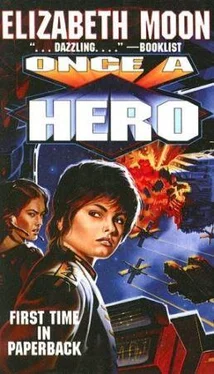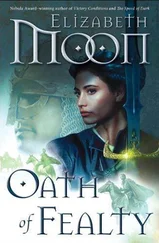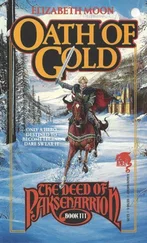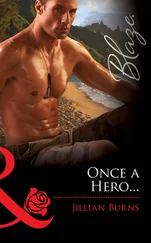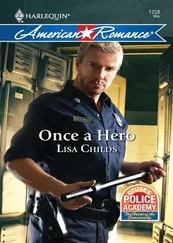Elizabeth Moon - Once a Hero
Здесь есть возможность читать онлайн «Elizabeth Moon - Once a Hero» весь текст электронной книги совершенно бесплатно (целиком полную версию без сокращений). В некоторых случаях можно слушать аудио, скачать через торрент в формате fb2 и присутствует краткое содержание. Жанр: Космическая фантастика, Боевая фантастика, на английском языке. Описание произведения, (предисловие) а так же отзывы посетителей доступны на портале библиотеки ЛибКат.
- Название:Once a Hero
- Автор:
- Жанр:
- Год:неизвестен
- ISBN:нет данных
- Рейтинг книги:3 / 5. Голосов: 1
-
Избранное:Добавить в избранное
- Отзывы:
-
Ваша оценка:
- 60
- 1
- 2
- 3
- 4
- 5
Once a Hero: краткое содержание, описание и аннотация
Предлагаем к чтению аннотацию, описание, краткое содержание или предисловие (зависит от того, что написал сам автор книги «Once a Hero»). Если вы не нашли необходимую информацию о книге — напишите в комментариях, мы постараемся отыскать её.
Once a Hero — читать онлайн бесплатно полную книгу (весь текст) целиком
Ниже представлен текст книги, разбитый по страницам. Система сохранения места последней прочитанной страницы, позволяет с удобством читать онлайн бесплатно книгу «Once a Hero», без необходимости каждый раз заново искать на чём Вы остановились. Поставьте закладку, и сможете в любой момент перейти на страницу, на которой закончили чтение.
Интервал:
Закладка:
For a moment, she thought he would try to pretend he didn’t understand, but then a quick wash of color rose to his cheeks and drained again.
“We did it for you, Esmaya.” That was what she’d expected to hear.
“No. Not for me. For the family, maybe, but not for me.” Her voice did not waver, which surprised her a little. She had decided to keep going even if her voice broke, even if she cried in front of him, which she had not done in years. Why should he be protected from her tears?
“For more than you, I admit.” He looked at her from under those bushy brows, gray now. “For the others—it was better that one child suffer that confusion—”
“Confusion? You call that confusion ?” Her body ached with remembered pain, the specific pains that had specific causes. She had tried to scream; she had tried to fight him off; she had even tried to bite. The strong adult hands, hardened by war, had held her down easily; bruising her.
“No, not the injuries, but not being sure what had happened—you couldn’t tell us who, Esmaya; you didn’t really see him. And they said you would forget . . .”
She felt her lips pulling back from her teeth; she saw in her father’s expression what hers had become. “I saw him,” she said. “I don’t know his name, but I saw him.”
He shook his head. “You couldn’t give us any details at the time,” he said. “You were exhausted, terrified—you probably didn’t even see his face. You’ve been in combat now as an adult; you know how confusing it is—”
He doubted. He dared to doubt, even now, her knowledge. A bright ribbon of images from Despite rippled through her mind. Confusing? Perhaps, in terms of organizing information to relate in court, but she could see the faces of those she had killed, and those who had tried to kill her. She always would.
“Show me the regimental roster,” she said, her voice choked with rage. “Show me, and I’ll point him out.”
“You can’t possibly—after all these years—”
“Sebastian says he killed him—that means you know who it is. If I can point him out, that should prove to you that I do remember.” That you were wrong, and I was right. Why it mattered so much to prove this was not a question Esmay wanted to examine. Proving a general wrong was professional suicide and military stupidity. But . . .
“You can’t possibly,” her father said again, but this time with no strength. He led the way to his study without another word; Esmay followed, forcing herself not to strike him down from behind. He moved to the console, and stabbed at the controls. Esmay noticed that his fingers were shaking; she felt a calm satisfaction. Then he stepped back, and she came forward to look.
The faces came up, six to a screen. She stared at them, one part of her mind sure that she would know, and another sure that she wouldn’t. Had her father even called up the right year? He wanted her to fail, that was clear enough. He might have cheated—but she could not believe that of him, even now.
Suizas did not lie . . . and he was her father.
He had lied before, because he was her father. She tore her mind away from that dilemma and stared at the screen.
She did not recognize most of the faces at all. She had no reason to; she had not been to Buhollow Barracks after her father was posted there. She found a few faces vaguely familiar, but unthreatening. They would have been men who had served with her father before, even among the household guard at the estancia. Among them, a much younger Sebastian Coron, whom she recognized instantly . . . so her memory was clear in some details that far back.
She could hear her father’s breathing, as she scrolled through the list. She did not look at him. It was hard enough to focus on the screen, to breathe through the tightness in her throat. Screen after screen . . . she heard her father shift in his chair, but he did not interrupt. Someone came to the door; she heard the rustle of clothing, but did not look up. Her father must have gestured, for without a word she heard the rustle of clothing retreat, and the gentle thud of the door as it shut.
Through the entire enlisted ranks, and she had not found that face her mind refused to show her. Doubts chilled her. The face she remembered had been contorted with whatever emotion makes men rape children . . . she might never find it among these solemn, almost expressionless faces in the catalog. It must be here . . . surely Coron would have told her if it had been someone in another unit, or an officer.
Or would he? She made herself keep going, to the officer ranks. There at the head was her father, no gray in his hair, his mouth one long firm line. Beneath, in descending order, the . . . her breath caught. Yes. Her heart fluttered then raced thunderously in her chest, spurred by the old fear. He stared out of the page, sleek and handsome, the honey-colored hair swept back . . . she remembered it darker, matted with sweat and dirt. But no doubt at all, not one.
She searched his face for clues to his choices . . . for some mark of depravity. Nothing. Regular features, clear gray eyes—coloring not that common on Altiplano, but much prized. The little button of an honor graduate, the braid on his epaulet that declared him an eldest son, of whom more was expected. His mouth was set in a straight line, a conscious copy of her father’s . . . it looked no crueler. His name . . . she knew his name. She knew his family. She had danced with his younger brothers, at the Harvest Games, the year before she left Altiplano for the stars.
Her mouth was too dry to speak. She struggled to swallow, to clear her tongue. She had struggled then, too. Finally she got out a word: “This.” She laid her finger on the image, surprised at the steadiness of her hand; her finger didn’t tremble at all.
Her father got up; she could hear him coming up behind her and fought not to flinch away. He grunted first, as if someone had slugged him in the belly. “Gods! You did —how did you—?”
Anger released her tongue. “I told you. I remember.”
“Esmaya . . .” It was a groan, a plea, and his hand on her hair was another. She slid aside from it, pushing herself away from the console, scrambling out of the chair.
“I didn’t know his name,” she said. Amazingly, it was easy to keep her tone even, her words crisp. “I was too young to have been introduced, even if he’d been at our house before. I couldn’t tell you his name, or give the kind of description that an adult might have been able to give. But I knew . You did not show me the rolls then, did you?”
Her father’s face, when she looked, might have been carven in bleached wood; it looked dry and stiff, unnatural. Was that her vision, or his reality? Her gaze wandered away, around the room, just noticing the familiar things before moving on to something else. In her mind, more and more of the certainties shifted, as if stone walls had been only scenery painted on movable screens. What did she really know about herself, about her past? What could she rely on?
Against this chaos the past years in Fleet stood firm: she knew what had happened there. From her first day in the prep school to the last day of the court-martial, she knew exactly what she had done, and who had done what to her. She had created that world for herself; she could trust it. Admiral Vida Serrano, an easy match for her father, had never lied to her . . . had never screened anyone else, at her expense.
Whatever she had had to suppress, to limit, in herself in order to make this haven was expendable. She didn’t need to find the part of herself that had loved to ride, or paint, or play antique instruments . . . she needed to keep herself safe, and she had managed that quite well. She could give up Altiplano; she had already done it.
Читать дальшеИнтервал:
Закладка:
Похожие книги на «Once a Hero»
Представляем Вашему вниманию похожие книги на «Once a Hero» списком для выбора. Мы отобрали схожую по названию и смыслу литературу в надежде предоставить читателям больше вариантов отыскать новые, интересные, ещё непрочитанные произведения.
Обсуждение, отзывы о книге «Once a Hero» и просто собственные мнения читателей. Оставьте ваши комментарии, напишите, что Вы думаете о произведении, его смысле или главных героях. Укажите что конкретно понравилось, а что нет, и почему Вы так считаете.
